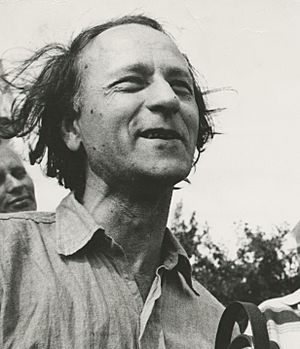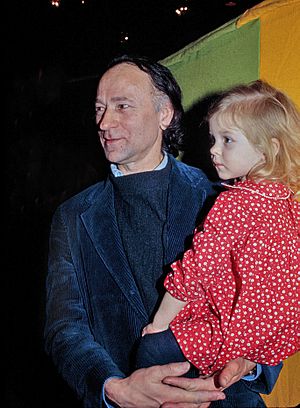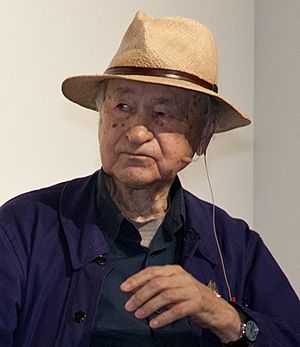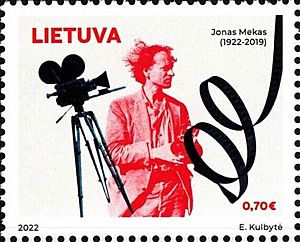Jonas Mekas facts for kids
Quick facts for kids
Jonas Mekas
|
|
|---|---|

Mekas in 1971
|
|
| Born | December 24, 1922 Semeniškiai, Lithuania
|
| Died | January 23, 2019 (aged 96) New York City, U.S.
|
| Nationality | Lithuanian-American |
| Alma mater | University of Mainz |
| Occupation |
|
| Years active | 1954–2019 |
| Movement | Avant-garde cinema |
| Spouse(s) | Hollis Melton |
| Children | 2 |
| Awards | Lithuanian National Prize (1995) |
| Signature | |
 |
|
Jonas Mekas (born December 24, 1922 – died January 23, 2019) was a Lithuanian-American filmmaker, poet, and artist. Many people called him "the godfather of American avant-garde cinema". This means he was a very important person in making new and unusual kinds of movies. His films and art have been shown in museums and at film festivals all over the world.
Mekas lived and worked in New York City. There, he helped start important places like Anthology Film Archives, which saves and shows special films. He also helped create The Film-Makers' Cooperative, a group for filmmakers, and a magazine called Film Culture. He was also the first person to write about movies for a newspaper called The Village Voice.
In the 1960s, Mekas fought against rules that stopped certain films from being shown. He stood up for artistic freedom, and many famous artists and writers supported him.
Mekas also helped many American artists and filmmakers. Some of these include Yoko Ono and Martin Scorsese. He also helped new film critics start their writing careers.
A historian named Michael Casper has written that Mekas worked for newspapers that supported the Nazi occupation of Lithuania during World War II.
Contents
Jonas Mekas' Early Life
Jonas Mekas was born in a place called Semeniškiai, Lithuania, on December 24, 1922. His parents were Elzbieta and Povilas Mekas. When he was a teenager, he went to school in Biržai, Lithuania.
In 1944, Mekas and his brother, Adolfas Mekas, left Lithuania. They were trying to get to Switzerland, a neutral country, but their train was stopped in Germany. They were held in a labor camp near Hamburg for eight months. They managed to escape and hid on a farm until the war ended.
After the war, Mekas lived in camps for people who had lost their homes. From 1946 to 1948, he studied philosophy at the University of Mainz in Germany. In 1949, he and his brother moved to the United States. They settled in Williamsburg, a part of Brooklyn, New York. Soon after arriving, Jonas bought a 16mm camera and started filming his daily life.
He learned about "avant-garde" films, which are experimental and artistic, by watching them at places like Cinema 16. He then started showing these kinds of films himself at different galleries and auditoriums.
Jonas Mekas' Film Career
In 1954, Jonas and his brother Adolfas started a film magazine called Film Culture. In 1958, Jonas began writing a movie column for The Village Voice newspaper. He also helped create The Film-Makers' Cooperative in 1962. This group helped independent filmmakers share their work.
In 1964, he helped start the Filmmakers' Cinematheque. This place later became Anthology Film Archives. It is now one of the biggest and most important places in the world for keeping and showing experimental films. Mekas worked closely with famous artists like Andy Warhol, Yoko Ono, and John Lennon.
In 1964, Mekas faced legal trouble for showing certain films. He fought against these rules, saying that artists should be free to show their work. He continued to show films at different museums and galleries. From 1964 to 1967, he organized film shows that traveled around Europe and South America.
In 1970, Anthology Film Archives opened as a film museum and library, with Mekas as its director. He helped start a big project there to collect and preserve important films. Mekas even appeared in a film by John Lennon and Yoko Ono called Up Your Legs Forever (1971).
As a filmmaker, Mekas made many different types of movies. Some were early story films, but he became famous for his "diary films." These films were like a video diary of his life. Examples include Walden (1969) and As I Was Moving Ahead Occasionally I Saw Brief Glimpses of Beauty (2000). These films showed the exciting experimental art scene of the 1960s.
Mekas also created art installations with multiple screens and sound. His work was shown at big art events like the Venice Biennial and in museums like the Serpentine Gallery.
In 2007, Mekas started a project called "The 365 Day Project." He released one short film every day on his website. This online diary is still available today.
From the 1970s, Mekas taught film classes at several universities, including New York University.
Mekas was also a writer. He published poems and stories in different languages. He wrote many of his journals and diaries, like I Had Nowhere to Go: Diaries, 1944–1954. In 2007, the Jonas Mekas Visual Arts Center opened in Vilnius, Lithuania, to honor his work.
One of Mekas' last art shows was called "Notes from Downtown" in 2018. His final film, Requiem, was shown after he passed away in 2019. It was a video commissioned by The Shed in New York City.
In 2018, an oral historian interviewed Mekas about his memories of World War II for an archive. In 2022, a big show called "Jonas Mekas: The Camera Was Always Running" was held at the Jewish Museum in the United States.
A German filmmaker named Peter Sempel made three films about Mekas' life and work: Jonas in the Desert (1991), Jonas at the Ocean (2004), and Jonas in the Jungle (2013).
Jonas Mekas' Family Life
Jonas Mekas married Hollis Melton in 1974. They had two children, a daughter named Oona and a son named Sebastian. His family often appeared in his films, including Out-takes from the Life of a Happy Man and As I Was Moving Ahead Occasionally I Saw Brief Glimpses of Beauty.
Jonas Mekas passed away at his home in Brooklyn on January 23, 2019. He was 96 years old.
A documentary film about Mekas, called Fragments of Paradise, was shown at the Venice Film Festival in 2022. It won an award for being the best documentary about cinema.
Awards and Honors for Jonas Mekas
Jonas Mekas received many awards and honors throughout his life for his contributions to film and art:
- Guggenheim Fellowship (1977)
- Lithuanian National Prize (1995)
- Doctor of Fine Arts, an honorary degree, from Kansas City Art Institute (1996)
- Special Tribute from the New York Film Critics Circle Awards (1996)
- Pier Paolo Pasolini Award (1997)
- Represented Lithuania at the 51st International Art Exhibition Venice Biennial (2005)
- His film Reminiscences of a Journey to Lithuania was chosen for preservation in the National Film Registry by the National Film Preservation Board (2006). This means it's considered an important film to be saved forever.
- Austrian Decoration for Science and Art (2008)
- Life Achievement Award at Rob Pruitt's Art Awards (2010)
- Commandeur de l'Ordre des Arts et des Lettres, a high honor from the Ministry of Culture in France (2013)
Jonas Mekas' Films
Here are some of the films Jonas Mekas made:
- Guns of the Trees (1962)
- The Brig (1964)
- Empire (1964)
- Walden (Diaries, Notes, and Sketches) (1969)
- Reminiscences of a Journey to Lithuania (1971–72)
- Lost, Lost, Lost (1976)
- Scenes from the Life of Andy Warhol (1990)
- Zefiro Torna or Scenes from the Life of George Maciunas (1992)
- As I Was Moving Ahead Occasionally I Saw Brief Glimpses of Beauty (2000)
- 365 Day Project (2007)
- Lithuania and the Collapse of USSR (2008)
- Sleepless Nights Stories (2011)
- Out-takes from the Life of a Happy Man (2012)
- Requiem (2019)
See also
 In Spanish: Jonas Mekas para niños
In Spanish: Jonas Mekas para niños




